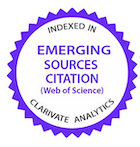Diagnósticos histomorfológico e imunofenotípico de tumores estromais gastrointestinais e outros sarcomas que acometem o intestino de cães
DOI:
https://doi.org/10.1590/1809-6891v24e-75610EResumo
Tendo em vista a semelhança morfológica entre tumores estromais gastrointestinais (GIST) e outros sarcomas do intestino de cães, objetivou-se realizar o diagnóstico histomorfológico e imunoistoquímico desses tumores, associando raça, sexo e idade, localização e invasão tumoral. Foram avaliados 217 casos por histopatologia e incluídos 36 diagnosticados por imuno-histoquímica (24 GIST e 12 outros sarcomas intestinais). Cães sem raça definida foram os mais diagnosticados com GIST, principalmente fêmeas idosas (9,5±2,2 anos); nos demais sarcomas intestinais, mestiços e Dachshunds, machos e fêmeas, foram igualmente acometidos. O ceco foi o mais acometido pelos GISTs, com invasão tumoral das camadas intestinais em todos os casos. O intestino delgado foi o mais acometido pelos demais sarcomas intestinais, com invasão das camadas na maioria desses tumores. GISTs expressaram marcadores como CD117 e DOG-1, ao contrário de outros sarcomas intestinais. O GIST e outros sarcomas intestinais denotaram características histomorfológicas e imunofenotípicas semelhantes à histopatologia, justificando a associação da imuno-histoquímica para o diagnóstico definitivo.
Palavras-chave: CD117; DOG-1; GIST; oncologia veterinária
Downloads
Referências
Leandro RM, Sá LRM. Tumor estromal gastrointestinal em cães: estudo clínico-anatomopatológico. Arquivo Brasileiro de Medicina Veterinária e Zootecnia. 2016; 68(4):938-944. Available in: https://doi.org/10.1590/1678-4162-8767.
Munday JS, Lohr CV, KiupeL M. Tumors in Domestic Animals: Tumors of the alimentary tract. 5 th ed. Iowa State Press: Offices, 2017.
Morrice M, Polton G, Beck S. Evaluation of the extent of neoplastic infiltration in small intestinal tumours in dogs. Veterinary Medicine and Science. 2019; 5(2):189-198. Available in: https://doi.org/10.1002/vms3.147.
Selmic LE, Selting KA, Reagan JK. Small Animal Clinical Oncology: Cancer of the gastrointestinal tract. 6 th ed. St. Louis: Elsevier, 2019.
Tiwari SB, Karki S. Epithelioid gastrointestinal stromal tumor of duodenum mimicking adenocarcinoma: a case report. Journal of Nepal Medical Association. 2021; 59(244):1310-1312. Available in: https://doi.org/10.31729/jnma.6104.
Inoue A, Ota S, Yamasaki M, Batsaikhan B, Furukawa A, Watanabe Y. Gastrointestinal stromal tumors: a comprehensive radiological review. Japanese Journal of Radiology. 2022; 40(1):105-1120. Available in: https://doi.org/10.1007/s11604-022-01305-x.
Berger EP, Johannes CM, Jergens AE, Allenspach K, Powers BE, Du Y, Mochel JP, Fox LE, Musser ML. Retrospective evaluation of Toceranib Phosphate (Palladia®) use in the treatment of grastrointestinal stromal tumors of dogs. Journal of Veterinary Internal Medicine. 2018; 32(6):2045-2053. Available in: https://doi.org/10.1111/jvim.15335.
Zhang Y, Renberg S, Papakonstantinou A, Flon FH. Diagnosing gastrointestinal stromal tumors: The utility of fine- needle aspiration cytology versus biopsy. Cancer Medicine. 2022; 11(14):2729-2734. Available in: https://doi.org/10.1002/cam4.4630.
Alcazar CM, Mahoney JA, Dittrich K, Stefanovski D, Church ME. Outcome, prognostic factors and histological characterization of canine gastrointestinal sarcomas. Veterinary and Comparative Oncology. 2021; 19(3):578-586. Available in: https://doi.org/10.1111/vco.12696.
Akahoshi K, Oya M, Koga T, Shiratsuchi Y. Current clinical management of gastrointestinal stromal tumor. World Journal of Gastroenterology. 2018; 24(26):2806-2817. Available in: https://doi.org/10.3748/wjg.v24.i26.2806.
Couto KM, Moore PF, Zwingenberger AL, Willcox JL, Skorupski KA. Clinical characteristics and outcome in dogs with small cell tcell intestinal lymphoma. Veterinary Comparative Oncology. 2018; 16(3):337-343. Available in: https://doi.org/10.1111/vco.12384.
Steeghs EMP, Gelderblom H, Ho VKY, Voorham QJM, Willems SM, Consortium P, Grunberg K, Ligtenberg MJL. Nationwide evaluation of mutation-tailored treatment of gastrointestinal stromal tumors in daily clinical practice. Gastric Cancer. 2021; 24(5):990-1002. Available in: https://doi.org/10.1007/s10120-021-01190-9.
Casali GP, Abecassis N, Ato TH, Bauer S, Biagini R, Bielack S, Bonvalot S, Boukovinas L, Bovee GMVJ, Brodowicz T, Broto MJ, Buonadona A, Álava E, Tos PD, Muro GX, Dileo P, Eriksson M, Fedenko A, Ferraresi V, Ferrari U, Ferrari S, Frezza MA, Gasperoni S, Gelderblom H, Gil T, Grignani G, Gronchi U, Haas LR, Hassan B, Hohenberger P, Issels R, Joensuu H, Jones LR, Judson E, Juta P, Kaal S, Kasper B, Kopeckova K, Kráková AD, Cesne LA, Lugowska E, Merimsky O, Montemurro M, Pantaleo AM, Piana R, Picci P, Neumann PS, Pousa LA, Reichardt P, Robinson HM, Rutkowki P, Safwat AA, Schoffski P, Sheijfer SS, Hall SK, Unk M, Coevorden VF, Graaf ATW, Whelan J, Wardelmann E, Zaikova O, Blay YJ. Gastrointestinal stromal tumours: ESMO-EURACAN clinical practice guidelines for diagnosis, treatment and follow-up. Annals of Oncology. 2018; 1(23):68-78. Available in: https://doi.org/10.1093/annonc/mdy095.
Russel KN, Mehler SJ, Skorupski KA, Baez JL, Shofer FS, Goldschmidt MH. Clinical and immunohistochemical differentiation of gastrointestinal stromal tumors from leiomyosarcomas in dogs: 42 cases (1990-2003). Journal of the American Veterinary Medical Association. 2007; 230(9):1329-1333. Available in: https://doi.org/10.2460/javma.230.9.1329.
Wang C, Jin MS, Zou YB, Gao JN, Li XB, Peng F, Wang HY, Wu ZD, Wang YP, Duan XM. Diagnostic significance of dog-1 and pkc-0 expression and c-kit/pdgfra mutations in gastrointestinal stromal tumors. Scandinavian Journal of Gastroenterology. 2013; 48(9):1055-1065. Available in: https://doi.org/10.3109/00365521.2013.816770.
Rios-Moreno MJ, Jaramillo S, Galhardo SP, Vallejo A, Mora M, García-Escudero A, Amérigo J, González-Cámpora R. Gastrointestinal stromal tumors (GIST): CD117, DOG-1 and PKC0 expression. Is there any advantage in using several markers? Pathology - Research and Practice. 2012; 208(2):74-81. Available in: https://doi.org/10.1016/j.prp.2011.11.006.
West RB, Corlees CL, Chen X, Rubin BP, Subramanian S, Montgomery K, Zhu S, Ball C A, Nielsen TO, Patel R, Goldblum JR, Brown P, Heinrich MC, Rijn MV. The novel marker, DOG1, is expressed ubiquitously in gastrointestinal stromal tumors irrespective of KIT or PDGFRA mutation status. American Journal of Pathology. 2004; 165(1):107-113. Available in: https://doi.org/10.1016/S0002-9440(10)63279-8
Lee CH, Liang CW, Espinosa L. The utility of discovered on gastrointestinal stromal tumor 1 (DOG1) antibody in surgical pathology- the GIST of it. Advances in Anatomic Pathology. 2010; 17(3):222-232. Available in: https://doi.org/10.1097/PAP.0b013e3181d973c2.
Elliott JW, Swinbourne F, Parry A, Baines L. Successful treatment of a metastatic gastrointestinal stromal tumour in a dog with toceranib phosphate (Palladia). ). Journal of Small Animal Practice. 2017; 58(7):416-418. Available in: https://doi.org/10.1111/jsap.12657.
Irie M, Tomiyasu H, Tsujimoto H, Kita C, Kagawa Y. Prognostic factors for dogs with surgically resected gastrointestinal stromal tumors. Journal of Veterinary Medical Science. 2021; 83(9):481-1484. Available in: https://doi.org/10.1292/jvms.20-0727.
Carson FL, Hladik C. Histotechnology - a self instructional text. 3 th ed. Chicago: ASCP Press, 400p., 2009.
Zhou Y, Wenging H, Chen P, Abe M, Shi L; Tan S, Li Y, Zong L. Ki67 is a biological marker of malignant risk of gastrointestinal stromal tumors. Medicine. 2017; 96(34): e7911. Available in: https://doi.org/10.1097/MD.0000000000007911.
Shales, C. Management of non-lymphomatous small intestinal tumours in dogs and cats. In Practice. 2015; 37(2):50-67. Available in: https://doi.org/10.1136/inp.h259.
Hayes S, Gurkan VY, Bryson EG, Kiupel M. Classification of canine nonangiogenic no lymphogenic, gastrointestinal sarcomas based on 14 microscopic, immunohistochemical, and molecular characteristics. Veterinary Pathology. 2013; 50(5):779-778. Available in: https://doi.org/10.1177/0300985813478211.
Yamamoto H, Handa M, Tobo T, Setsu N, Fujita K, Oshiro Y, Mihara Y, Yashikawa Y, Oda Y. Clinicopathological features of primary leiomyosarcoma of the gastrointestinal tract following recognition of gastrointestinal stromal tumours. Histopathology. 2013; 63(2):194-207. Available in: https://doi.org/10.1111/his.12159.
Dailey DD, Ehrhart EJ, Duval DL, Bass T, Powers BE. Dog1 is a sensitive and specific immunohistochemical marker for diagnosis of canine gastrointestinal stromal tumors. Journal of Veterinary Diagnostic Investigation. 2015; 27(3):268-277. Available in: https://doi.org/ 10.1177/1040638715578878.
Robertson S, Patil DT. An update on the role of immunohistochemistry in the evaluation of gastrointestinal tract disorders. Advances in Anatomic Pathology. 2020; 27(3):193-205. Available in: https://doi.org/10.1097/PAP.0000000000000214.
Hemmings C, Yip D. The changing face of GIST: implications for pathologists. Pathology. 2014; 46(2):141-148. Available in: https://doi.org/10.1097/PAT.0000000000000047.
Frgelecová L, Skoric M, Fictum P, Roman H. Canine gastrointestinal tract tumours: a retrospective study of 74 cases. Acta Veterinary BRNO. 2013; 82(4):387-392. Available in: https://doi.org/10.2754/avb201382040387.
Patnaik AK, Hurvitz AL, Johnson GF. Canine gastrointestinal neoplasms. Veterinary Pathology. 1977; 14(6):547-555. Available in: https://doi.org/10.1177/030098587701400602.
Frost D, Lasota J, Miettinen M. Gastrointestinal stromal tumors and leiomyomas in the dog: a histopathologic, immunohistochemical, and molecular genetic study of 50 cases. Veterinary Pathology. 2003; 40(1):42-54. Available in: https://doi.org/10.1354/vp.40-1-42.
Cho SH, Seung BJ, Kim SH, Lim HY, Sur JH. Overexpression and mutation of p53 exons 4-8 in canine intestinal adenocarcinoma. Journal of Comparative Pathology. 2020; 175(1):79-84. Available in: https://doi.org/10.1016/j.jcpa.2019.12.008.
Maas CPHJ, Haar GT, Gaag IVD, Kirpensteijn J. Reclassification of small intestinal and cecal smooth muscle tumors in 72 dogs: clinical, histopathologic, and immunohistochemical evaluation. Veterinary Surgery. 2007; 36(4):302-313. Available in: https://doi.org/10.1111/j.1532-950X.2007.00271.x.
Mantese, G. Gastrointestinal stromal tumor: epidemiology, diagnosis, and treatment. Current Opinion in Gastroenterology. 2019; 35(6):555- 559. Available in: https://doi.org/10.1097/MOG.0000000000000584.
Mettinen M, Lasota J. Gastrointestinal stromal tumors: Pathology and prognosis at different sites. Seminars in Diagnostic Pathology. 2006; 23(2):70-83. Available in: https://doi.org/10.1053/j.semdp.2006.09.001.
Hirota S. Differential diagnosis of gastrointestinal stromal tumor by histopathology and immunohistochemistry. Translational Gastroenterology and Hepatology. 2018; 3(27):1-12. Available in: https://doi.org/10.21037/tgh.2018.04.01.
Novelli M, Rossi S, Rodriguez-Justo M, Taniere P, Seddon B, Toffolatti L, Sartor C, Hogendoorn PCW, Sciote R, Van G, Verweij J, Blay JY, Hohenberger P, Flanagan A, Dei Tos AP. DOG1 and CD117 are the antibodies of choice in the diagnosis of gastrointestinal stromal tumor. Histopathology. 2010; 57(2):259- 270. Available in: https://doi.org/10.1111/j.1365-2559.2010.03624.x.
Kisluk J, Gryko M, Ustymowicz-Guzinska K, Kemona A, Kedra B. Immunohistochemical diagnosis of gastrointestinal stromal tumors – an analysis of 80 cases from 2004 to 2010. Advances in Clinical and Experimental Medicine. 2013; 22(1):33-39.
Miettinen M, Lasota J. Gastrointestinal stromal tumors (GISTS): definition, occurrence, pathology, differential diagnosis and molecular genetics. Seminars in Diagnostic Pathology. 2003; 54(1)3-24.
Leandro RM, Freitas FP, Sá LRM. The importance of clinical, histopathological and immunohistochemical marking for differential diagnosis of non-hematopoietic gastrointestinal mesenchymal neoplasms in dogs: literature review. Brazilian Journal of Veterinary Research and Animal Science. 2017; 54(4):287-297. Available in: https://doi.org/10.11606/issn.1678-4456.bjvras.2017.128846.
Sarlomo-Rikala M, Tsujimura T, Lendahl U, Miettinen M. Patterns of nesting and other intermediate filament expression distinguish between gastrointestinal stromal tumors, leiomyomas and schwannomas. Journal of Pathology, Microbiology and Immunology. 2002; 110(6):499- 507. Available in: https://doi.org/10.1034/j.1600-0463.2002.100608.x.
Wang MX, Devine C, Segaran N, Ganeshan D. Current update on molecular cytogenetics, diagnosis and management of gastrointestinal stromal tumors. World Journal of Gastroenterology. 2021; 27(41):7125-7133. Available in: https://doi.org/10.3748/wjg.v27.i41.7125.
Zhao WY, Xu J, Wang M, Zhang ZZ, Tu L, Wang CJ, Lin TL, Shen YY, Liu QCH. Prognostic value of Ki67 index in gastrointestinal stromal tumors. International Journal of Clinica & Experimental Pathology. 2014; 7(5):2298-2304.
Downloads
Publicado
Como Citar
Edição
Seção
Licença
Copyright (c) 2023 Ciência Animal Brasileira / Brazilian Animal Science

Este trabalho está licenciado sob uma licença Creative Commons Attribution 4.0 International License.
Autores que publicam nesta revista concordam com os seguintes termos:
- Autores mantém os direitos autorais e concedem à revista o direito de primeira publicação, com o trabalho simultaneamente licenciado sob a Licença Creative Commons Attribution que permite o compartilhamento do trabalho com reconhecimento da autoria e publicação inicial nesta revista.
- Autores têm autorização para assumir contratos adicionais separadamente, para distribuição não-exclusiva da versão do trabalho publicada nesta revista (ex.: publicar em repositório institucional ou como capítulo de livro), com reconhecimento de autoria e publicação inicial nesta revista.
- Autores têm permissão e são estimulados a publicar e distribuir seu trabalho online (ex.: em repositórios institucionais ou na sua página pessoal) a qualquer ponto antes ou durante o processo editorial, já que isso pode gerar alterações produtivas, bem como aumentar o impacto e a citação do trabalho publicado (Veja O Efeito do Acesso Livre).






























